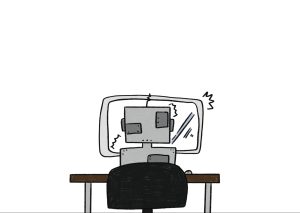
ChatGPT continues to exceed expectations for artificial intelligence language generators as educators across the country struggle to adjust to the new, AI-enhanced educational climate.
ChatGPT is a large language model released by the artificial intelligence company OpenAI in late November 2022. By entering a series of simple prompts, anyone can generate pages and pages of written text. Students across the country have been using ChatGPT to write their essays and help them do their homework. Some educators fear that essay writing will become a thing of the past, but others are more optimistic about the future of AI in education.
Marc Watkins, a lecturer in composition and rhetoric in UM’s Department of Writing and Rhetoric, has been using artificial intelligence tools in his classes and is optimistic about the future of AI in education. He recently wrote an article in Inside Higher Ed about how ChatGPT will impact education and the world.
“I think large language models like GPT-3 and ChatGPT can benefit students, if they are employed carefully and openly. Students can likely use the technology to augment their existing writing and research skills,” Watkins said. “Some of the apps we used with students in the fall, like Elicit and Fermat, are geared towards helping students brainstorm and use those skills.”
Elicit is an “AI research assistant” meant to streamline researchers’ workflow, while Fermat offers a wide variety of tools such as image generation and brainstorm assistance.
Microsoft announced on Jan. 23 that it is continuing a partnership with OpenAI while also investing $10 billion dollars in the company and considering implementing ChatGPT into Microsoft Word, Outlook and Powerpoint. Some of the most popular education software might be outfitted with AI soon.
OpenAI recently released a statement on educator considerations for ChatGPT outlining the potential uses and problems with AI in the classroom. The company also released plans to give students the ability to share ChatGPT usage as part of an assignment.
“Ultimately, we believe it will be necessary for students to learn how to navigate a world where tools like ChatGPT are commonplace. This includes potentially learning new kinds of skills, like how to effectively use a language model, as well as about the general limitations and failure modes that these models exhibit,” the article reads.
Watkins agrees with this sentiment.
“AI literacy is going to be a major topic for students and teachers, and this literacy isn’t going to be limited to language models. We’re increasingly seeing AI employed in search engines, self-driving vehicles, surveillance proctoring services, even the live captioning feature in Zoom uses natural language processing, a form of AI. It’s all around us, and we need to be aware of its impact on our day-to-day lives,” Watkins said.
At the University of Mississippi, Watkins is part of the AI Task Force led by Robert Cummings, executive director of academic innovation for the Academic Innovations Group and associate professor of writing and rhetoric for the Department of Writing and Rhetoric.
“Writing is changing. Literacy is changing,” Cummings said. “One key thing to point out is that prior to the arrival of these tools, if we looked at a piece of writing, we assumed that a human had written it. That has changed and it’ll never go back. We can no longer assume that there’s a human behind a piece of writing. It’s going to take a long time for our brains to adjust.”
Cummings believes that using AI generators for writing is going to become increasingly commonplace and essential to many aspects of our lives in the coming years.
“Teaching writing is going to become more and more about the management of these tools, because everybody’s first draft is going to be increasingly AI generated. And I don’t just mean a first draft for papers in academia, but a first draft for business memos, a first draft on anything, it’s all going to have an increasing amount of AI generated content,” Cummings said. “It’s going to be increasingly important to be able to sort through whether your ideas are your ideas or AI ideas, and what’s going to happen is going to be a shift between humans staring at a blank page to him staring at a first draft generated by an AI, and thinking to himself, ‘Does this first draft say what I want it to say? Is that accurate? Is it my voice?’”
OpenAI has released a tool to determine whether text was possibly written by AI called the AI Text Classifier, but OpenAI admits that AI-generated text can be easily altered to bypass it.
Cummings announced that the AI Task Force is developing courses about AI for university undergraduates.
“We’re in the process of developing an AI certificate or digital badge for undergraduates. Ambitiously, I hope to announce enrollments in the fall, but I don’t know if we’ll get there,” Cummings said. “It’s gonna be a three-course sequence; the first course is the principles of AI, so it’s going to be the fundamentals of how AI operates; the second course is going to be about the ethics of AI; the third course will be an applications course with different units across the campus. We’ll have courses about AI and how it impacts their field.”
As Google announces an AI that can generate music from text prompts and OpenAI’s Dall·E 2 image generator creates complex and strange works of art, many are worried that human creativity might soon be outcompeted by AI superiority. What’s more, many prominent AI art generators are currently facing lawsuits from artists who claim the AI was trained on their art without permission.
“You’re not composing music because you think you’re going to erase Bach from the face of the earth. You’re composing music, because it means something to you, right?” Cummings said. “If you stopped doing that because Google has developed an AI generator that’s going to create music for you based on textual inputs, you will be sad, the world will be sad. I don’t think that’s going to happen.”
Like the vision of ChatGPT and AI creating the first draft of your essay, Cummings has a similar idea for how AI will impact human creative works.
“I just think it’s going to alter the way that you play music. Our first idea is more likely to be influenced by AI and where you take it from there is going to be up to you,” Cummings said.
However, Cummings acknowledged that this is the viewpoint pushed by shareholding companies and developers of AI, and what these impacts will be is impossible to forecast.
“I think the developers want us to believe that it’s about access and democratization. It remains to be seen,” Cummings said.
The AI Task Force is open for students and faculty to join and will hold its next meeting on Feb. 23 in student union room 326. The task force also held a meeting open to faculty and students on Feb. 1 at noon in the Union Ballroom.
Watkins made sure to highlight that while ChatGPT and AI technology are certainly impressive, they are far from being able to replace a human’s writing skills.
“One thing to keep in mind is language models like ChatGPT don’t actually write text — they generate it. To write something, a human being brings an understanding of purpose, audience, context, even morality into the process of writing,” Watkins said. “ChatGPT has no such capacity. It cannot tell you the purpose behind a response, who an audience is, reality test a source, or anything that a human can because AI cannot think.”


























